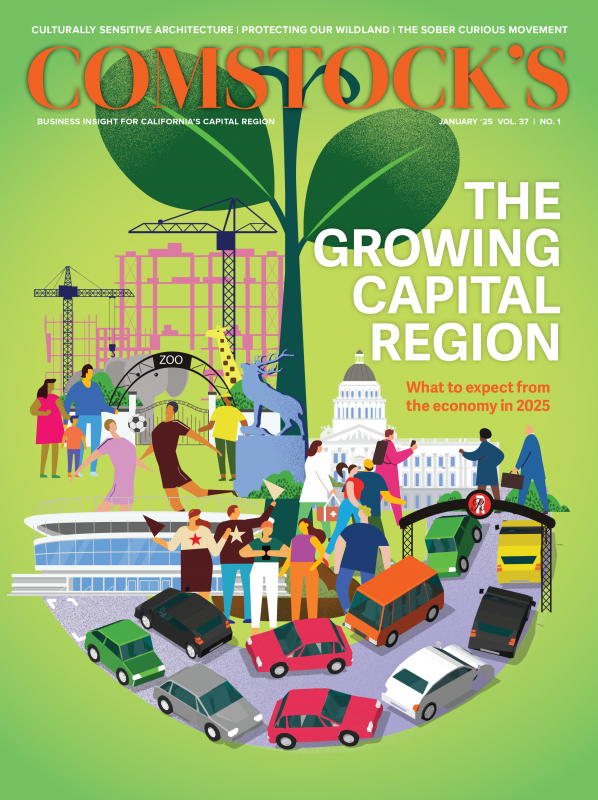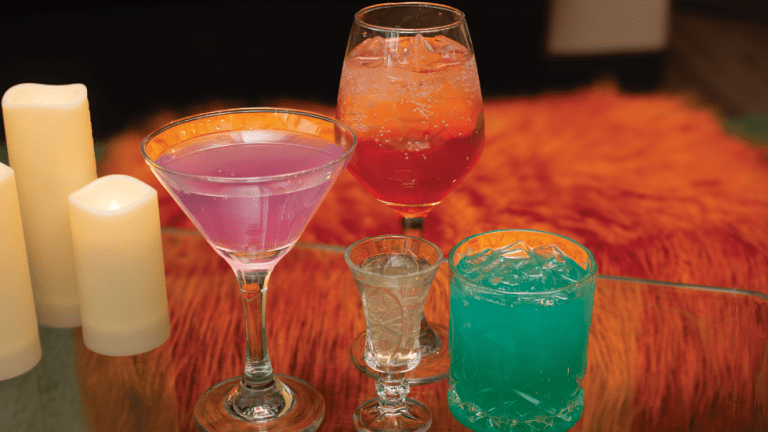
This story is part of our January 2025 issue. To subscribe, Click here.
It was a moment of clarity for Amanda Altman Brincat.
“We were in Vegas — I popped a White Claw and was like, ‘I don’t want this anymore,’” she says. “My whole social life revolved around going out for drinks and celebrating,” she shares. “So not only did I have this big gap in my time, but also in how I handled my emotions. I realized very quickly that I needed a replacement. She put it down and hasn’t had a drink since.
Alcohol is deeply ingrained in American culture, a billion-dollar industry that finds its way into everything from birthday parties to business deals to relaxation, socializing and de-stressing. But it’s a love-hate relationship: The California Highway Patrol reported more than 1,100 drunk driving arrests over Thanksgiving 2024 weekend alone. And there are estimated to be more of 178,000 alcohol-related deaths in the United States each year.
The COVID-19 pandemic has seen alcohol sales increase, with more than half of Americans drinking more during lockdowns. However, it seems that today younger generations are starting to reverse the trend.
Earlier this month, the U.S. surgeon general released a report warning that alcohol can cause cancer and advocating the use of warning labels. Alcohol stocks I dove.
A 2023 Gallup poll shows that while alcohol consumption rates have increased among older adults, alcohol consumption among 18- to 34-year-olds has fallen 10% over the past decade, from 72% to 62%. At the same time, cannabis use has reached record levels across all age groups.
With economic pressures, a deeper awareness of mental health issues, and trends like Dry January and Sober October, Millennials and Gen Z are driving the “sober curious” movement, rethinking their relationship with alcohol to make healthier, more intentional choices.
It’s a gradual shift, but one that reflects a broader cultural shift that has inspired some local pioneers to create new spaces in a growing segment.
The Teetotalist: blazing new trails
Amanda Altman Brincat, left, co-owns with her wife, Kathryn, right, The Teetotalist, a pop-up bar specializing in craft cocktails made with non-alcoholic drinks, such as gin, vodka and bourbon.

After a search for sober activities left them uninspired, Amanda and her co-owner and wife Kathryn Altman Brincat were joking one day when they came up with the idea of opening their own bar. “Why not, we thought,” she said. “It didn’t exist here.”
The Teetotalist launched in 2022 and quickly grew in popularity, thanks to a welcoming soft drinks community eager to support a burgeoning industry and a customer base (around 30% of Gen Z and half of Millennials) who have destigmatized the not wanting to drink. “I think our generation and the younger generation place more importance on mental health than older generations,” says Kathryn. “People just want to be more present these days. »
The duo has been active at events such as the recent Farm-to-Fork festival, local markets and even a movie premiere, but rising costs and dwindling crowds have led them to suspend their pop-ups as they continue their search for a permanent location.
“We just want people to be the best version of themselves,” says Amanda. “Whether they’re our regulars because they don’t drink or they just want to try something new. We just want people to be happy and healthy.
Non-alcoholic cocktails and the rise of RTDs
Navigating the nightlife while sober can be a challenge, but a carefully crafted mocktail can make the transition easier. While the concept is nothing new – legend has it that Shirley Temple was the first – the modern mocktail is a sophisticated drink that goes well beyond simply cutting out the alcohol.
A focus on fruit, floral and herbaceous elements, and key ingredients like bitters can create mocktails with ambiance. The Teetotalist’s “Bee Happy” mixes Dhos Gin Free, honey syrup, butterfly pea powder and lemon. Kathryn’s favorite, “The U-Hauler,” mixes a zero-proof spirit called Dromme with lemon and apricot jam.
The sector has exploded in recent years. Sales of non-alcoholic beer, wine and liquor soared 32% between 2022 and 2023. Earlier this year, a non-alcoholic beer became the top-selling beer at Whole Foods. Even singer Katy Perry released her own brand of alcohol-free aperitifs in 2022.
Lindsay Nader, co-owner and marketing director of Ro Sham Beaux in Midtown Sacramento, says the growing trends currently in the ready-to-drink, or RTD, market are mushroom-based ingredients, often lion’s mane or reishi , and adaptogens – herbs and plants believed to neutralize the effects of stress on the body. According to UCLA Health, “growing research shows that adaptogens help the body regulate itself in several ways, including improving mood, balancing hormones, fighting fatigue, and strengthening the immune system.”
“Basically, something that’s going to help your nervous system,” says Nader. “There are some who will raise and others who will soften. They’re like health tonics that sort of replace a cocktail. They mainly help relieve stress, increase dopamine levels, and regulate your cortisol levels.
Ro Sham Beaux: embrace innovation
If the trend challenges traditional bars, it also pushes them to innovate. “Actually, it’s not even a trend anymore, it’s common,” says Nader, who says most places today offer at least a small selection of non-alcoholic drinks. The team, management and owners also make these choices, she says. “As a company, we’re doing our best to adapt and deliver amazing products that people still want to enjoy.”
Ro Sham Beaux, an intimate wine bar in Sacramento, offers an extensive menu of non-alcoholic drinks. General manager Alec Moreno prepares a mocktail. One of the most popular is Baccalauréat, which features the juice of unripe red grapes.

“If someone says, ‘Oh, I don’t drink,’ we always say, ‘No, no, let me make you something delicious that you can really enjoy holding in your hand,'” says Nader .
Ro Sham Beaux’s zero proof menu is extensive and they pride themselves on making mocktails that people will remember. Their best-seller, Baccalaureate, combines Verjus rouge (the pressed juice of unripe red grapes) with Seedlip, a British brand of non-alcoholic spirits. A selection of non-alcoholic beers, wines and CBD sparkling water rounds out their menu.
“With this influx of people not drinking alcohol, we now have a ton of new products on the market to play with,” says general manager Alec Moreno, who says customers love seeing a full page of options without alcohol. “It’s exciting for them and they feel more welcome.”
Nader agrees. “I think people are really proud of the choices they make. We have a lot of people who come here and don’t drink alcohol, and I repost their stories on Instagram, and it looks like they’re having the craziest night,” she shares. “So, I think that the stigma of “Oh, you don’t drink” starts to disappear.”
Hella Happy Aura: modern health tonics
“I think people in general are more health conscious now and looking to boost themselves in different ways,” says Tori Steele, owner of Hella Happy Life, an herbal mocktail pop-up bar that launched in 2021 and has recently celebrated a grand opening at its new space, Hella Happy Aura, inside the Guild Theater in Oak Park. Steele’s mission is to provide a social and creative space where people can connect over functional mocktails created with more traditional medicinal herbs.
“My mocktails combine herbs and adaptogens to create healing modalities for social anxiety or nervousness,” says Steele, a former bartender turned herbalist. “Drinks that relax and calm but without alcohol” — like Désir, an “aphrodisiac” composed of damiana (made from wild shrubs), Schisandra berry, skullcap, dragon fruit and tonic. “Basically, I try to name drinks after whatever people are looking for when they drink alcohol,” she explains.
Similar to the Altman Brincats, Steele was newly sober and hungry for more engaging experiences. “Going to a regular bar isn’t enough, it’s not as fun,” she explains. “I find that being in a creative space really helps me open up and talk to people.” This led her to organize a multitude of events and workshops: flower arrangements, sound baths and meetings between business women. “At Hella Happy, our values are presence, growth and elevation,” says Steele. “It’s about finding different ways to connect.”
For those trying Dry January or looking for a long-term change, Steele advises: “Take it one day at a time. One experience at a time. Just keep making the decision over and over again. I’m not going to drink today, and before you know it, it will be 30 days.
Healthy management
“I think one of the huge benefits of month-long reset challenges like Sober October and Dry January,” says Dr. Katren Tyler of UC Davis Medicine, “is that 30 days is about the time period in which people who are social or moderate drinkers can actually change their habits and perhaps re-evaluate their relationship with what they consume. Tyler says those who participate generally want to make a healthy change and may simply need to reset their habits in a healthy direction.
For those who suspect a serious alcohol addiction, it’s generally not advisable to stop drinking, Tyler says. “There are now medical options that can help people get sober without the risks of alcohol withdrawal,” she says.
But for those who feel like they’re just taking a break, Tyler says sobriety month is a great time to reflect and ask tough questions. “Do you ever participate a little too generously? A month without this substance can be a good reminder of some of the benefits you might experience.
It’s all about balance, says Tyler, and figuring out what really works for you.
Stay up to date with the latest news from the Capital Region: Subscribe to the Comstock newsletter today.



